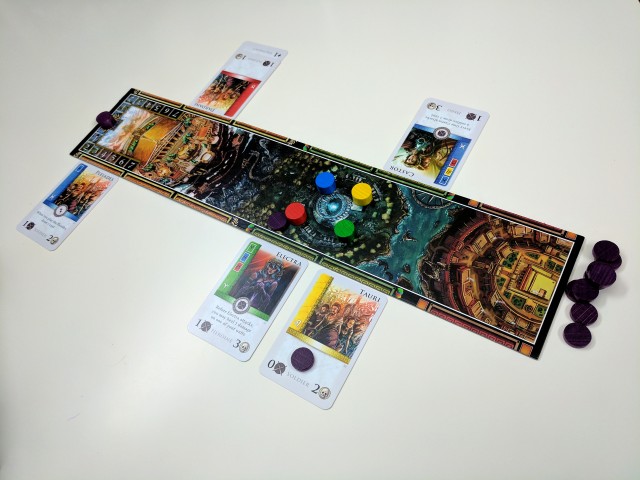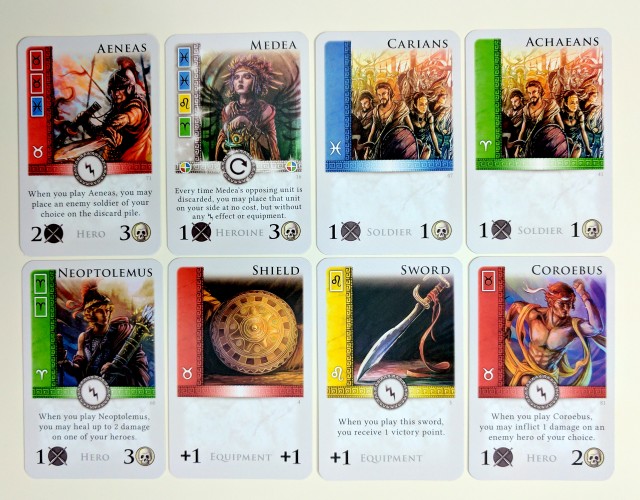Mythology seems to be having a moment in the board game scene. Between A Feast for Odin and The Oracle of Delphi, to Inis and Santorini, the old gods have all the buzz these days. Enter Fight for Olympus, the latest entry in the Lookout Games two-player series, and one from an accomplished designer, Matthias Cramer (Kraftwagen, Rococo, Glen More).
Fight for Olympus aims to add some flavour to the typical lane-control battle game by peppering its cards with recognizable characters, each hitting the table with a unique special ability. The theme is loose, but even the victory conditions seem to tell an appropriate story: gods can  either duel toe-to-toe (manipulating the tug of war-style VP track) or achieve all-out victory by winning over the mortals (having control of every lane at the start of your turn, a feat that surely requires use of lower-cost mortal cards).
either duel toe-to-toe (manipulating the tug of war-style VP track) or achieve all-out victory by winning over the mortals (having control of every lane at the start of your turn, a feat that surely requires use of lower-cost mortal cards).
Cards are dual-use, with players choosing to use them either as the depicted character, or as currency to pay for card play (discard them from hand). This means that from the game’s onset, players are hit with tough decisions about which cards to play, pay with, and retain in hand.
Choosing which lane to play a character to is also a rather strategic decision, as at the end of each turn, all of your played characters will activate in one of two ways. If there is an opposing character, then it will be dealt damage by your character (and potentially removed from play). If a character is unopposed, they will trigger a special board ability, specific to their lane. Three of the lanes award a victory point, two provide future card play currency in the form of tokens, and one grants an additional card draw.
Unfortunately, those tense strategic decisions are less likely to leave players feeling accomplished, and more prone to instilling a sense of  dread. A big play involves both several turns of planning and the mortgaging of several future turns by emptying your hand. Dread enters when due to the luck of the draw, there’s no guarantee as to when the next opportunity to make a strong move will come.
dread. A big play involves both several turns of planning and the mortgaging of several future turns by emptying your hand. Dread enters when due to the luck of the draw, there’s no guarantee as to when the next opportunity to make a strong move will come.
The jamboree of character abilities leaves the game wide open, and there are some fairly undesirable board states, such as near-stalemate conditions with an inevitable but obvious winner. Particularly cruel are abilities that limit an opponent’s card draw, constricting the lifeblood of this game.
Decrying randomness in games on principal is often a short sighted judgement, but it’s one that is warranted with Fight for Olympus, as there simply aren’t enough options for players to mitigate their luck. Rather than win through careful planning, players more often flip back and forth between having a good hand and not. They take turns: one player builds up while another draws cards in frustration. Occasionally, those roles will flip, until one player runs away with the game. This sort of gameplay can work as part of a longer game experience, and one with more players (where luck is diluted by a group’s desire to take down the leader), but Fight for Olympus is a quick two-player battle, and a deeply unsatisfying one at that.
Comments
No comments yet! Be the first!